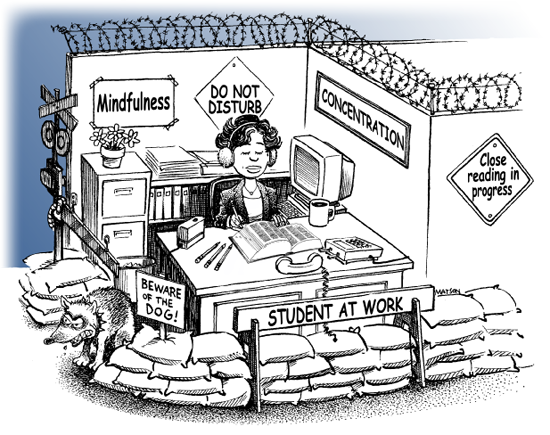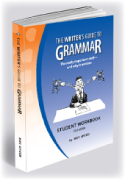|
newsletter — April 8, 2014
Does your student really "dig in"?
Keys to building good study habits
 High school work should build foundational skills students will use for the rest of their lives, both in college and later, in their professional lives — skills like taking notes, annotating texts, being organized, scheduling tasks, prioritizing, and so on. High school work should build foundational skills students will use for the rest of their lives, both in college and later, in their professional lives — skills like taking notes, annotating texts, being organized, scheduling tasks, prioritizing, and so on.
In these newsletters we'll address such skills as a set of practices we call digging in. What we mean by "digging in":
- studying with real purpose;
- burrowing into a topic or text with the intention of getting to the bottom of it, of mastering it;
- hauling out usable nuggets of information;
- dragging into the light any hidden meanings.
Any student can adopt the practices involved in "digging in." But parents, take note: The habit of focused, intentional work does not come naturally to all students. To many it is anathema — at least in the beginning — and it diverges sharply from the study habits most kids form in the elementary and middle school years.
Students who are naturally bright are easily misled by the experience of the middle-school years, when they may find themselves able to get by with only superficial study habits: reading without annotation, taking cursory notes (or none at all), writing papers off the tops of the heads, and the like. For such students, high school work can be a much-needed wakeup call — but only if we steer them to coursework that demands rigor.
The least fortunate are those who skate through their high school work without such a wakeup call and then land in college, where superficial study habits can exact a heavy toll. Such students may find themselves falling behind in their classes and locked in a perpetual race to keep up.
| Study skills programs. There are many on the market, and many are online and free. To see a list of such programs, go here in our Resources section. |
We'll use this newsletter to examine these skills in some detail. In this issue, we'll focus on just one: close reading. As you weigh our discussion of this skill, think of your own student, and ask yourself:
Where does my student stand?
How can I get my student to adopt these practices, develop these habits?
Close reading
What it is:
|
- Grappling with difficult text.
- Reading for understanding.
- Forging mental connections to other material, other knowledge the student already possesses.
|
Challenges we underestimate:
|
- The need for self-awareness.
- The tension between intellectual honesty and intellectual laziness.
|
 "Close reading" is less about technique than about new levels of intention and mindfulness. It begins with the search for context. "Close reading" is less about technique than about new levels of intention and mindfulness. It begins with the search for context.
The search for context
When your student reads, does he or she always know:
- basic information about the author? — like his or her name, nationality, whether living or dead, basic biographical sketch, field of expertise, political affiliations, etc.;
- basic information about the work? — like when it was written, the intended audience, the topics covered, the type of work (short story, novel, sonnet, biography, autobiography, essay, popular history, academic history), etc.
In the elementary and middle school years, students were seldom expected to familiarize themselves with context before diving into a work, whether it was a Harry Potter novel or a history text, like The Story of the World. But in the high school years, such information is vital, and for two reasons:
- It gives the student perspective on what he or she is reading, enabling the student to situate, to anchor the work in time and place.
- It enables the student to begin forging mental connections to other knowledge, other topics with which he or she is already familiar.
- It gives some preliminary basis for the student to begin evaluating the work — a perpetual challenge throughout high school, college, and life.
To take a familiar example: If you learn that a novel is autobiographical, it alters the way you read it. Another example: Orwell's Animal Farm is just a story about animals unless you know that it's an allegory — and in particular, an allegory of the Russian Revolution.
Mindfulness in the reading experience
It is perfectly normal — especially when dealing with a difficult text — to mentally "go out to lunch" from time to time, to stare at the page empty-headed: I wonder what's for dinner… — The question is whether your student is onto him- or herself, aware of his or her own mental comings and goings, monitoring them, and when needed, steering back to the topic at hand.
| Not on our mailing list? — Adding yourself is easy; just go here. |
Monitoring your own experience as you read is vital. Even the going-out-to-lunch experience provides vital clues about your relationship with what you're reading: we don't space out for no reason; there's always a reason — even if it's just mental fatigue, time for a break. If we can pinpoint the spot at which our attention drifted, we can often identify the cause right in the text — the author made a historical reference unfamiliar to us; or the thought became really abstract, we had no mental picture of what was being referred to; or the author went off on a tangent or abruptly introduced a new train of thought and, mentally stuck in the previous point, we didn't follow.
The point is, the mindful student:
- is aware of such reading mishaps and takes charge of his or her own learning experience;
- discovers the need to develop mental stamina, staying power, and embarks on a steady regimen of close reading with challenging material.
The challenge of intellectual honesty
One of the greatest temptations for the student working alone with a difficult text is pretending to understand: the student glides past something he or she doesn't understand and just keeps reading. The student does it mainly because telling the truth (I have no idea what this means…) leads directly to additional work (like looking up a word in the dictionary, or googling a puzzling allusion).
Equally important is the fact that pretending to understand can easily become a pernicious habit — one that is precisely the opposite of "digging in." What makes the habit pernicious is that eventually the student fails even to notice when he or she doesn't understand.
Solutions
The struggle that never really goes away is the struggle between, on the one hand, mindfulness and intellectual honesty and, on the other, intellectual laziness.(Even as adults we face that struggle.) As parents, the best thing we can do for our students is not to judge, but to guide the student toward developing:
- self-awareness;
- high standards;
- strong skills.
A big part of the solution will be sustained coursework with certain characteristics:
- it should focus on close reading;
- the material used should reward handsomely the effort of close reading.
What's more, this kind of high-level coursework is best sustained through the high school years — especially if your student has already developed poor study habits: it may take as long to unmake those habits as it took to form them.
Finally, close reading is most effective when supported by and integrated with two additional practices:
- annotating the text;
- taking good notes.
We'll address both these skills in future newsletters. In the meantime, check out the list of study skills programs in our Resources area. They can help raise your student's awareness of the range of skills needed.
* * *
Not on our mailing list? — Adding yourself is easy; just go here.
|
|
|
View all our online courses here.
Eight weeks, in depth, live & online
Twice weekly sessions for two semesters
Twice weekly sessions for two semesters
- March 7, 2020: Beyond the Tour: Getting the most from your college visits
- July 29, 2019: Advocating for oneself, Part 2: College admissions essays & interviews
- May 29, 2019: What our students aren't taught about grammar
- May 16, 2017: Advocating for oneself (Part 1 of 2)
- July 20, 2016: The development of adolescent minds
- December 24, 2015: The appeal of videogames—and the hazards they bring
- August 16, 2015: Three skills your student needs to develop before college (Part 1 of 3)
- July 3, 2015: How literature is now taught in college—and why enrollment in literature courses is in steep decline
- June 1, 2015: Teaching Shakespeare to your kids: What I've learned
- Dec 28, 2014: Extracurricular activities, Part 2
- July 27, 2014: Levels of annotation —
Annotating the text, Part 2
- July 15, 2014: Extracurricular activities, Part 1
- July 2, 2014: Teens need to be together… An innovative solution
- June 9, 2014: The college admissions racket — Getting things into perspective
- June 2, 2014: Building good study habits
— Annotating the text, Part 1
- April 8, 2014: Building good study habits
— Close reading
- March 18, 2014: Why all our students must study Shakespeare
- Feb 25, 2014: Standardized tests, Part 2
- Feb 18, 2014: Standardized tests, Part 1
- Feb 1, 2014: Advanced mathematics
|
|
Shakespeare Intensives
Close reading of Shakespeare
Ten online sessions of 90 minutes
Ten online sessions of 90 minutes
Seven online sessions of 90 minutes
An introduction to Shakespeare's comedy
Eight online sessions of 90 minutes
ONLINE: English Language Arts
— Now open for registration —
Weekly online class
in the essentials of English
 This two-semester course is taught by the author of The Writer's Guide to Grammar. It puts in place skills and knowledge foundational to the study of English and the mastery of clear writing. The weekly class is live and online, and students master all the most important principles of the English language — grammar, usage, punctuation, and more. This two-semester course is taught by the author of The Writer's Guide to Grammar. It puts in place skills and knowledge foundational to the study of English and the mastery of clear writing. The weekly class is live and online, and students master all the most important principles of the English language — grammar, usage, punctuation, and more.
Online Writing
Two semesters of online classes
Two classes per week
Online Literature
Two semesters of online instruction
Training for parents
Now an online series!
This program addresses the principal concerns parents have about homeschooling through high school — curriculum and credits, standardized tests, transcripts and record-keeping, the application process, pursuing scholarships, and more.
Terrific. Full of information. The materials were so thorough. I now have a plan of action. Also, this workshop is inclusive: No matter what type of homeschooler you are, you will understand better how to prepare your student for college and present him or her in the best light.
Mother of two
|
|
![]()